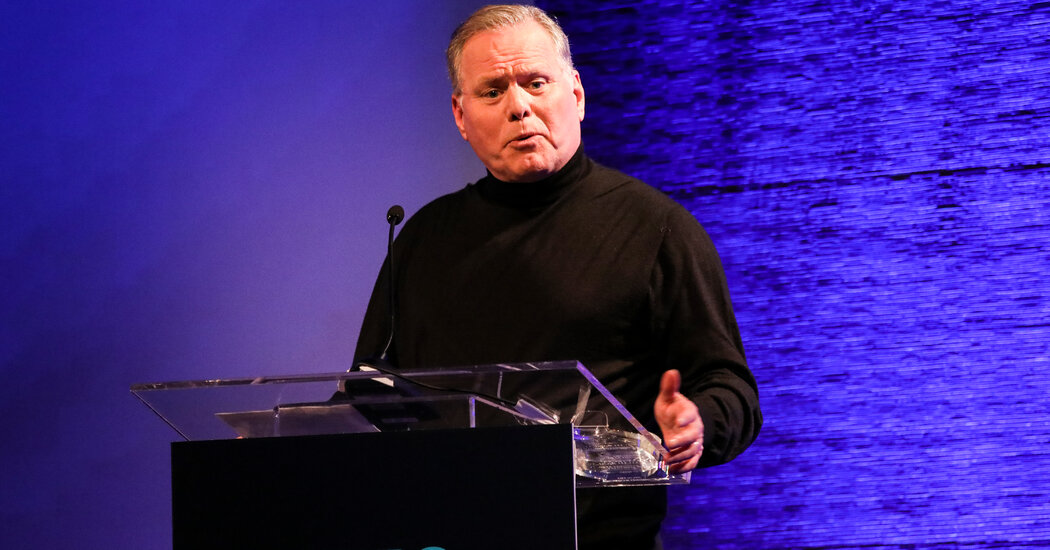Media mogul David Zaslav selected Chris Licht to head CNN last year, handing over the reins of one of the nation’s top news organizations to a longtime show producer. On Wednesday, just 13 months later, Mr. Zaslav that he changed course, and Mr. Light was out.
“It didn’t work out for a number of reasons, and that’s a shame,” said Mr. Zaslav during an editorial interview with CNN employees Wednesday morning. “And I take full responsibility for that.”
So what is Mr. Zaslav’s next move?
After the appointment of Mr. Light said Mr. Zaslav said he didn’t want CNN to become an “anti-Trump network,” a reference to his plan to voice a wider range of political views, including conservatives.
Mr. Zaslav is still committed to that strategy, two people familiar with his mindset said, but he faces a major hurdle: recruiting a replacement for Mr. Licht who shares that vision for CNN and can regain the editors’ trust , who had expressed outrage at Mr. Licht’s leadership.
Mr. Zaslav must also find a financial future for CNN, which relies heavily on its declining cable affiliate and TV advertising business. The company’s profits fell to less than $1 billion last year, the lowest in many years, including $200 million in one-time losses for closed-loop streaming service CNN+.
Through a spokesperson, Mr. Zaslav to comment. But during the phone call on Wednesday, he said he was committed to a recruitment process to find Mr Licht’s successor. That’s a major departure from his previous approach: Mr. Licht was personally appointed by Mr. Zaslav, without speaking to candidates other than Mr. Licht, according to two people who knew about his selection.
Mr. Zaslav, 63, is a tough boss who manages down to the smallest detail. He is known for holding meetings in the morning, sometimes as early as 7am, and thinking along with strategic details. He has described himself to employees as a “fixer,” telling them he wants to hear bad news quickly so he can deal with it.
He has pulled off a series of bold mergers that have catapulted him to the highest echelons of the media industry. In 2018, more than a decade after becoming CEO of Discovery, he struck a deal to merge the company with non-fiction TV rival Scripps Networks Interactive, giving the combined company greater power in its negotiations with cable providers. While at Discovery, he also expanded the company’s sports programming and secured a deal for the rights to broadcast the Olympics internationally.
Warner Bros. Discovery and CNN have been the subject of occasional media industry speculation as potential acquisition targets. But Mr. Zaslav emphatically told employees in a town hall last year that the company and its divisions were not for sale.
His profile skyrocketed in 2021 after he announced a merger with Warner Media, putting him in charge of crown jewels like CNN, HBO and the Warner Bros. film studio. The deal cemented Zaslav’s rise from the head of a small mid-Atlantic cable company to a media mogul overseeing prestigious film and TV productions as well as a premier news network.
Over the years, he has had his hands in the cable news business. He played a role in the founding of CNBC when he was an executive at NBC decades ago, where he helped expand distribution for the corporate news channel.
He has called CNN the “largest journalism organization in the world.”
Mr. Zaslav has described his vision of expanding political positions at CNN in heroic terms, likening it to the fight against tyranny in World War II. In a meeting with CNN staffers in March defending Mr. Licht, Mr. Zaslav said CNN was moving towards a “rendezvous with destiny”, adding that it would not become an “advocacy network” for any political position whatsoever.
“I am so proud that every day at CNN we have the opportunity to be a true purveyor of facts and truth in journalism, and to be a place where people can go to make a national and global to have a conversation about what’s going on in the world.’ Mr. Zaslav said, according to a recording of his remarks.
Mr. Zaslav has a close relationship with John Malone, the cable news mogul who is an influential shareholder of Warner Bros. Discovery. In an interview last year, Mr. Malone cited Fox News host Bret Baier as a reliable centrist newscaster and said he was open to “crazy” opinion programming from the political left and right, provided those shows were clearly labeled opinion programming.
A loyal circle of confidants have worked with Mr. Zaslav for years: David Leavy, CNN’s chief operations officer; Adria Alpert Romm, the chief people and culture officer; Bruce Campbell, the Chief Revenue and Strategy Officer; and Jean-Briac Perrette, the president and chief executive of the global streaming and games division of Warner Bros. Discovery.
Although CNN accounts for only about 5 percent of Warner Bros. Discovery has generated an overwhelming number of headlines about the company in recent months.
Mr. Zaslav is hopeful that Mr. Licht’s departure will give the company a brief respite from wall-to-wall critical coverage, according to a person who has spoken to him in recent days. But Mr. Zaslav sees the situation at CNN as his problem to be solved.
“This is my fault,” said Mr. Zaslav, according to a recording of his remarks from Wednesday morning’s phone call.

